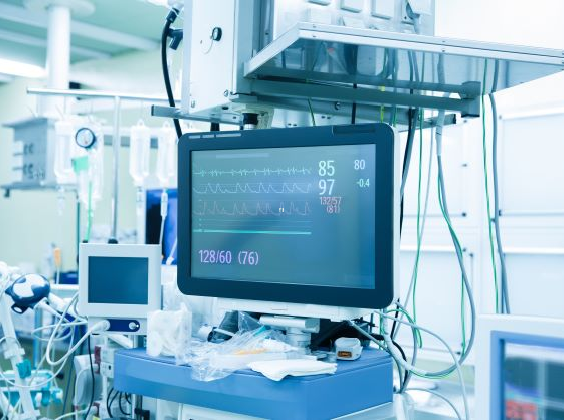
Written by

Cranfield, UK, 30th June 2023, Written by Kelly Patrick –
In this monthly news round up, I am providing some of the latest news and developments impacting the clinical care markets that caught my eye in recent weeks, including my thoughts on the implications for the market.
1. Masimo gains FDA 510 (k) clearance for Radius VSM
Masimo announced earlier in June that it has gained its 510 (k) approval for its Radius VSM wearable continuous monitor. This follows its CE marking that was received in November 2020. The VSM has a modular platform that includes Masimo SET® pulse oximetry, non-invasive blood pressure, temperature, respiration rate, and electrocardiography (ECG). Masimo follows an expanding list of vendors that are actively developing solutions to target the increased demand for solutions that can help improve the level of continuous monitoring whilst allowing for ambulation and movement. GE Healthcare released its Portrait solution in 2022, whilst Mindray also launched its mWear solution in China in 2020, and in Europe in 2022, but is still awaiting regulatory approval in the US. Signify Research has assessed the mobile continuous monitoring market within its upcoming Interim Patient Monitor report, which is projected to see fastest growth of all monitoring product segments. This segment is definitely one that will see most development in coming years with new product releases expected.
2. CalmWave gains accolade as 2023 Digital Health Awards Winner for Connected Digital Health: Clinical Decision Support Tools
Interest in clinical decision support is at an all-time high; the promise to improve care provision utilising the vast amounts of patient data to support informed decisions is increasingly attractive to overstretched physicians. Clinical decision support solutions can collate data and identify missing pieces of information to provide a complete picture of the patient’s status and to support the treatment pathway. A number of solutions have steadily been launched, offering the next big thing in the use of artificial intelligence to support clinical processes.CalmWave uses AI to personalise early warning alerts by providing more accurate alarm parameters by patient category or even individual patient. By providing more specific alarms, alarm fatigue is reduced and focus is placed on actionable alarms. In June 2023, CalmWave was announced as the 2023 Digital Health Awards Winner for Connected Digital Health: Clinical Decision Support Tools. Signify Research recently attended the AACN NTI congress in May and discussed several of the innovations seen at the show in its insight, including adapting alarming and predictive patient monitoring.
3. Google leaps forward with Mayo Clinic to bring generative AI to healthcare
Google has announced its collaboration with the Mayo Clinic in the United States in which the Mayo Clinic is trialling Google’s Enterprise Search in Generative AI App Builder. The app aims to improve the efficiency of clinical workflows, helping clinicians to gain information they require to help improve patient outcomes. The Enterprise Search in the Gen App Builder enables the unification of data across dispersed documents, databases, and intranets, making it easier to search, analyse, and identify the most relevant results. The solution is also now ready to support HIPAA compliance. The Mayo clinic is an early adopter of the Gen App Builder and is working with clinicians to explore how the combination of Google-quality search engines with generative AI cansurface important information in a seamless way. Signify Research released its thoughts on Google’s generative AI solution and the wider partnership in its premium insight here.
4. Partnerships in the cardiac space keep on coming
The cardiac market continues to see additional developments with two partnerships announced in June. Philips announced its partnership with Biotronik in which it combines the cardiac rhythm management portfolio from Biotronik with Philips’ SymphonySuite device programs. The relationship aims to target the expanding out-of-hospital care provision within office-based labs (OBLs) and ambulatory surgical centers (ASCs). This will provide Philips the opportunity to maximize its own portfolio (through its acquisition of BioTelemetry) ensuring it can cater to a wider range of needs expanding on its own offering of telemetry, holter, event recorders and associated remote monitoring services.
AliveCor has yet again made another announcement; this time it has collaborated with Luscii to offer the first virtual heart clinic in a box. The partnership combines AliveCor’s 6L KardiaMobile ECG solution with Happitech™ PPG, and Omron™ blood pressure and weight, in addition to the CHA2DS2-VASc Score. The combination offering provides one platform for virtual wards and remote patient monitoring that has been inspired by the European Society of Cardiology guidelines. The solution aims to help enhance the monitoring capabilities of AFib patients with an app to support patients in their patient pathway and helping to improve compliance with medication and/or preparing for cardioversion or ablation.
5. Health tech giants tap into clinician and patient wants and needs
GE Healthcare recently released its Reimagining Better Health study. The study assessed opinions from over 5,000 patients and 2,000 clinicians, gaining their thoughts on their needs, hopes and expectations in relation to healthcare provision. The study highlights the goals, trends and barriers in healthcare provision seen by those interviewed. It concluded that there was one common goal ‘A healthcare experience that is more human and flexible, focusing on the needs of both clinicians and patients’. It also demonstrated 6 trends that will evolve healthcare and 9 barriers that must be overcome to address this common goal. This study follows a similar assessment that Philips conducts on an annual basis in its Future Index report 2023 which was published earlier in the year. This study focused on 3,000 clinical professionals across 14 countries, assessing the role of new care delivery models, which integrate in-person and virtual care within and beyond hospital walls. This study also highlighted the need to tackle the burden on overstretched healthcare professionals whilst focusing on digital technology to improve efficiencies, experiences, and outcomes. These studies demonstrate that healthcare technology vendors are wanting to drive solution innovation in healthcare with both the patient and clinicians’ needs in mind.
6. Regulatory boards review guidance for device software
The Food and Drug Advisory board (FDA) has recently released its final update to the guidance for recommended documentation for premarket submissions for FDA evaluations of the safety and effectiveness of device software functions. This includes software functions that meet the definition of a device under section 201(h) of the Federal Food, Drug, and Cosmetic Act (FD&C Act). The guidance expands on that previously developed in May 2005 to offer recommendations on the information required to support submissions for approval. One of the main updates includes a risk-based approach to the level of documentation required. The more complex the software is, the greater the level of documentation is required. The FDA categorizes the software into two sub-segments: Basic and Enhanced. Basic Documentation will be required for software that is low-risk, while Enhanced Documentation will be required for software that is high-risk. The guidance also describes objective evidence that is required to be generated and documented during software development, verification, and design validation. The aim is to ensure the safety and effectiveness of software by requiring manufacturers to take a more rigorous approach to software development. It is hoped that the new regulations will provide more clarity on the requirements for documentation for approvals to ensure the safety and effectiveness of medical device software. Similar approaches are being made by regulators globally, with the UK’s MHRA releasing its Software and AI as a Medical Device Change Programme – Roadmap last year, and also recently updated part of the roadmap to include its AI and Digital Regulations Service, that helps to guide vendors to navigate the regulatory processes.
About Kelly Patrick
Kelly joined Signify Research in 2020 as a Principal Analyst. She has over 15 years’ experience covering a range of healthcare technology research at IHS Markit/Omdia. Kelly’s core focus has been on the Clinical Care sector, including patient monitoring, diagnostic cardiology, respiratory care, and infusion and associated IT solutions. Kelly holds a BSc degree with honours in Pharmacology from the University of Leeds. In her spare time, Kelly has a passion for running and outings with her husband and three children.
About the Clinical Care Team
The clinical care team provides market intelligence and detailed insights on the clinical care equipment and IT markets. Our areas of coverage include patient monitoring, diagnostic cardiology, infusion pumps, ventilators, anaesthesia devices, and high-acuity IT. Our reports provide a data-centric and global outlook of each market with granular country-level insights. Our research process blends primary data collected from in-depth interviews with healthcare professionals and technology vendors, to provide a balanced and objective view of the market.
About Signify Research
Signify Research provides healthtech market intelligence powered by data that you can trust. We blend insights collected from in-depth interviews with technology vendors and healthcare professionals with sales data reported to us by leading vendors to provide a complete and balanced view of the market trends. Our coverage areas are Medical Imaging, Clinical Care, Digital Health, Diagnostic and Lifesciences and Healthcare IT.
Clients worldwide rely on direct access to our expert Analysts for their opinions on the latest market trends and developments. Our market analysis reports and subscriptions provide data-driven insights which business leaders use to guide strategic decisions. We also offer custom research services for clients who need information that can’t be obtained from our off-the-shelf research products or who require market intelligence tailored to their specific needs.
More Information
To find out more:
E: enquiries@signifyresearch.net
T: +44 (0) 1234 986111
www.signifyresearch.net
